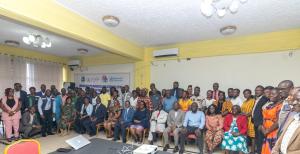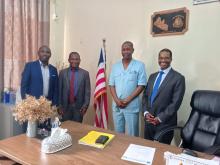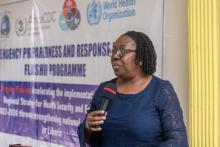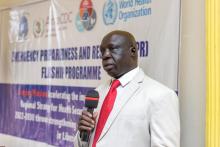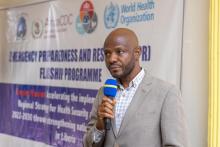WHO and Africa CDC conclude Scoping Mission on Emergency Preparedness and Response (EPR) Flagship Initiatives in Liberia.
The World Health Organization (WHO) and Africa Centres for Disease Control and Prevention (Africa CDC), in partnership with the government of Liberia have successfully concluded a week-long scooping mission aimed at enhancing the country’s capacity to health security preparedness and response.
The mission brought together a diverse group of stakeholders from the country. Its primary objectives were to raise awareness among government and critical stakeholders of EPR flagship initiatives, conduct a comprehensive situation analysis to identify existing resources, gaps, priorities, and critical activities, and develop a budgeted two-year roadmap to strengthen Liberia's health security.
These initiatives are part of the WHO Regional Strategy for Health Security and Emergencies 2022-2030, endorsed by African Ministers of Health in Togo in 2022. The strategy aims to strengthen member states capacities to effectively prepare, detect and respond to public health emergencies through three flagship programmes i) Promoting the resilience of systems for emergencies (PROSE), ii) Transforming African Surveillance Systems (TASS), and iii) Strengthening and Utilizing Response Groups for Emergencies (SURGE).
Speaking during the opening of the technical session, Dr. Catherine Cooper, Deputy Minister of Health and Chief Medical Officer in Liberia, expressed the importance of the country participating in such important flagship programs and thanked WHO for including Liberia.
"Liberia has made significant strides in epidemic preparedness and emergency response. However, the Ebola epidemic of 2014-2016 and the COVID-19 pandemic exposed weaknesses in our health system resilience and epidemic preparedness. The flagship initiatives offer an opportunity to enhance our preparedness and response capacities to better protect our people from the impacts of epidemics and disasters," stated Hon. Dr. Catherine Cooper, Deputy Minister of Health and Chief Medical Officer in Liberia.
Dr. Peter Clement, WHO Representative to Liberia, emphasized the importance of strengthening epidemic preparedness and response within the One Health context. "The findings of this mission and the roadmap developed will guide our collaborative efforts in ensuring Liberia is better prepared and its population protected against the devastating effects of health emergencies and disasters. The cost of building capacity and preparing for emergencies is much lower than the cost of emergency response, especially if the country is not well prepared, as evidenced by the lessons learned from the Ebola outbreak and the COVID-19 pandemic," said Dr. Clement.
The mission engaged with the Legislative and Senate health committees, UN Country Team, health development partners, Ministry of Health, Ministry of Agriculture, Ministry of Commerce, Ministry of Defense, National Public Health Institute of Liberia (NPHIL), National Disaster Management Agency (NDMA), WASH Commission, Environment Protection Agency (EPA), Forestry Development Authority, Water & Sewerage Co-operation, Embassies of Germany and France, International and National partners. These engagements served as a platform to advocate for investment in preparedness, detection, and response to public health emergencies and disasters.
Dr. Brian Chirombo, WHO Representative in Rwanda who led the mission team from the Africa Regional Office, highlighted that the scoping mission represented a crucial step for identifying cost-effective interventions in Preparedness, Detection and Response to Public Health Emergencies and Disasters that can enhance and strengthen the country's core capacities and resilience to emerging and re-emerging health threats. Liberia now becomes the 28th African country to undergo this exercise.
Hon. Solomon Hedds Williams, Deputy Minister for Agriculture, stressed the need for strengthened collaboration among sectors at both national and sub-national levels during preparedness and response to disease outbreaks and disasters, “We need to strengthen our collaboration among sectors at the national and sub-national during preparedness and response to disease outbreaks and disasters especially on Laboratory capacity, one health electronic surveillance, emergency stockpiling, community health, training and equipping an emergency workforce of responders”.
Hon. Dabah M. Varpilah, Chairperson of the Health Committee of Parliament, expressed gratitude for the mission, noting its timeliness as the country develops its national development plan and the County Development Agenda. She emphasized the committee's commitment to advocating for increased funding to the health sector, and fast-tracking the passage of the public health law. She further requested WHO and Af-CDC to provide catalytic resources to kick start implementation of the roadmap and also advocate among other development partners for their buy in.
The EPR Flagship Initiatives to be led by the Government of Liberia, is expected to complement efforts and investments towards building a resilient health system capable of effectively preventing, preparing for, detecting, and responding to public health emergencies and disasters using the One Health approach. Moving forward, the country will finalize, validate, and disseminate the two-year roadmap by 30 August 2024, with key actions to initiate the implementation of the flagship initiatives tailored to Liberia's specific needs. This collaborative mission by WHO and Africa CDC was funded by the United Kingdom government (Foreign Commonwealth and Development Office - FCDO).
Communications Officer
Phone : (266) 590 17166
Email: nangwalel [at] who.int (nangwalel[at]who[dot]int)
Health Promotion & Social Determinants of Health Officer
WHO, Liberia Country Office
Tel : +231776532008
Email : vlake [at] who.int (vlake[at]who[dot]int)
Epi-Surveillance/IDSR Team Lead
WHO-Liberia
+ (231)776106795
drmondayj [at] gmail.com (drmondayj[at]gmail[dot]com)
